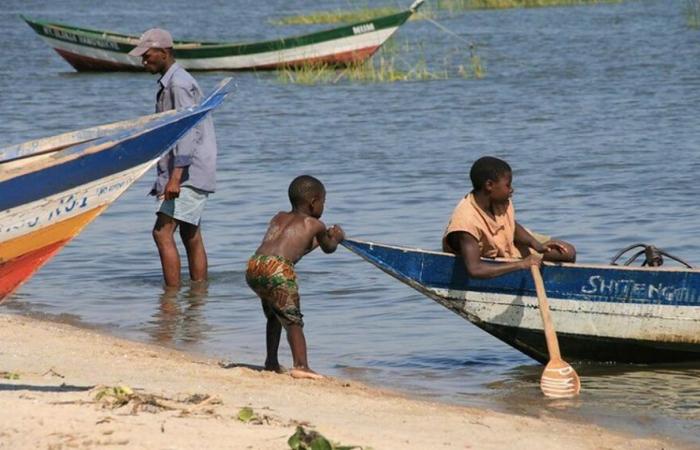At dawn, the beach in Nansio, the capital of Ukerewe District in Tanzania,
appears idyllic. The gentle sound of waves crashing on the sand slowly wakes up
the inhabitants. Ukerewe Island, covering an area of 500 square kilometers and
located 50 kilometers from Mwanza, is encircled by Lake Victoria’s waters.
Faustin, 35, watches the lake surrounding his island, Africa’s largest, with
nostalgia. “When I was a child, the water didn’t reach this far,” he says,
pointing to what now looks like a small island that was once connected to the
beach where he stands. “Now, water enters our homes. We had a rice field here,
but it’s been underwater for two years,” he adds, gesturing to a vast area
partially submerged by the lake.
Further inland, the situation is just as dire. Dried-up land has made it
difficult to grow cassava plants. Faustin offers an explanation: “I think the
problem is the rain. Right now, it rains very little, but when it does, it
pours heavily. People can’t farm because it’s too dry, and then, when it rains,
everything floods,” explains the father of five in simple terms.
A climate change phenomenon
Faustin’s observations are accurate. Rising sea levels aren’t the only
concern linked to climate change. According to new satellite data from the
French National Centre for Space Studies, the increasing water levels of East
Africa’s great lakes are alarming. In 2024, Lake Victoria’s water level
exceeded all record years since 1992.
The cause isn’t an increase in rainfall frequency, but rather its intensity,
driven by more frequent extreme weather events. Compounding this, the El Niño
phenomenon—unrelated to human activity—has, over the past two years, warmed the
Pacific Ocean, causing global temperature increases and exceptional rainfall
events.
Lake Victoria, which gets 80% of its water from rainfall and only 20% from
rivers (unlike other lakes), is particularly vulnerable to this influx of rain
and intense droughts. “Since we began documenting and studying weather pattern
changes, we’ve realized that climate change could be responsible for many
disruptions in and around the lake,” notes Joyce Komanya of the Legal and Human
Rights Centre in Dar es Salaam.
Communities forced to relocate
“This island has been inhabited for a long time, but what’s happening now is
unprecedented,” continues Komanya, who authored a report on climate impacts on
socio-economic and environmental rights in Tanzania.
Among the consequences of rising waters are displaced populations. In April,
torrential rains submerged 50 homes, forcing 300 people to evacuate. In 2020,
major floods in Lake Victoria led to the displacement of thousands in Kenya and
Uganda, two countries bordering the lake.
On Ukerewe Island, John Ngaile’s home was gradually swallowed by the rising
waters. “I lived here for 15 years and tried to build a wall to keep the water
out, but it eventually took everything,” he says, limping over the submerged
ruins of his former house. Losing his home also meant losing significant income
from renting rooms and farming a nearby plot of land.
Beyond material loss, Ngaile’s life has changed dramatically. With a
sorrowful expression, the 58-year-old reflects on how much the loss of his
previous life affects him: “I used to live here by the water. I rented out
boats; life was good. Now I have nothing. I live far from the lake. It’s
completely changed me—I went from being poor to very poor.”
Disrupted ecosystems
The most immediate consequence of these climate changes on Ukerewe Island is
economic. Most of the 380,000 residents rely on fishing, an increasingly
challenging livelihood due to the dwindling fish population in Lake Victoria.
While inappropriate fishing techniques and the introduction of Nile perch—a
predatory invasive species by British colonists in the 1950s—are partly to
blame, they don’t tell the full story.
Rising water levels and climate change have drastically altered the lake’s
ecosystems. Deeper, warmer waters now make the environment unsuitable for some
fish species. “When it rains heavily, local fishermen say it takes time for
rainwater and lake water to become friends,” explains Paschal Phares, a
fisherman’s son and guide on Ukerewe Island.
This poetic metaphor captures a grim reality. “In the past, you could catch
two buckets of fish in half an hour. Now you can fish all night and return
empty-handed,” laments Richard, a local fisherman. To counter the fish
shortage, Richard and a small group of fishermen are attempting aquaculture,
but these artificial farming methods are costly, and the government has so far
provided no financial assistance.
Women on the front lines
Some residents choose to leave the island permanently, often abandoning
their wives and children. In Murutunguru, in northern Ukerewe, a group of about
15 women gathers on a dry, tree-dotted plot of land, singing together. Their
common bond: they’ve been left behind by their fisherman husbands, who
abandoned them to manage households alone, without income.
Among them is 28-year-old Sarah Bigambo, a mother of six. Her husband left
when she was pregnant with their youngest daughter. “He sent money for the
first month, then I never heard from him again,” she says, staring into the
distance. Sarah survives by working in fields for 5,000 Tanzanian shillings
(about $1.80) per day. “If there’s no work, we don’t eat,” she explains.
Sarah is part of a women’s group organized by the Tanzanian association Sauti
Ya Wanawake (“The Voice of Women”), which makes and sells soap.
However, the income is meager. “Mama Deborah,” the group’s representative and a
self-proclaimed activist, shares her frustration: “It’s heartbreaking to see
these families torn apart,” she says. “Men are to blame first, but so is
society. Abandoning women has become normalized,” says Deborah, whose husband
remains by her side.
A little farther away, Habiba, a 47-year-old mother of three, recounts her
struggles. “The children go to school without eating all day and come back with
no energy. I tell them to stay strong, but it’s hard. I don’t know where their
father is; he left without saying goodbye. We women can’t abandon our families.
We keep fighting for our children.”
Women remain the primary victims of climate change. While Africa has warmed
faster than the global average over the past 60 years, it contributes only 4%
of global CO2 emissions—half of Europe’s output.
Half the world’s lakes and reservoirs are losing water
- Lakes cover about 3% of the Earth’s surface but hold 87% of its liquid
freshwater.
- A 2023 study published in Science revealed that over
half of the world’s lakes and reservoirs are losing water, primarily due to
declining rainfall.
- Over 30 years, researchers estimated that the 1,972 water bodies studied
lost an amount of water equivalent to the United States’ total consumption in
2015.
- Like oceans, lakes store carbon, but they lose this ability when they dry
up, exacerbating global warming.






